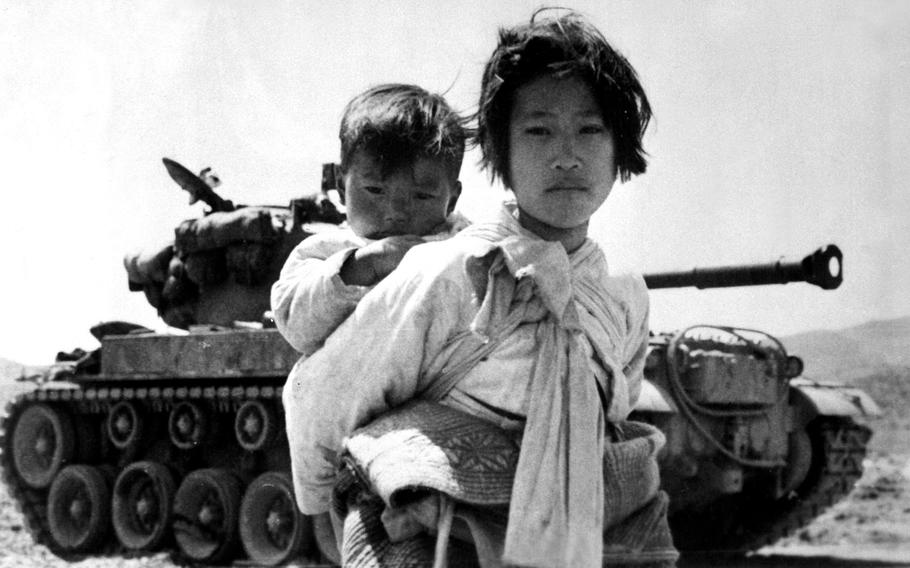
With her brother on her back, a Korean girl tiredly trudges by a stalled M-26 tank in Haengju, Korea, June 9, 1951. (U.S. Army)
SEOUL, South Korea — Discussions over an end-of-war declaration with North Korea will soon come to a close, a South Korean government official said.
The country’s Ministry of Unification chief, Lee In-young, made the remarks during an academic conference at Hankuk University of Foreign Studies’ campus in Seoul on Friday.
The Unification Minister said Seoul and Washington, D.C., “have been holding deep discussions very seriously” regarding a declaration to formally end the war, adding that it “is coming to a finish to some degree.”
Lee said an end-of-war declaration “is a reasonable approach” to the ongoing impasse on the Korean Peninsula.
“South Korea, North Korea and the U.S. can form trust amongst one another after putting down their antagonism and confrontations without any drastic situational changes,” he said.
Lee also qualified his remarks by addressing the uncertainty surrounding North Korea reciprocating a potential end-of-war declaration.
“It is yet not transparent whether North Korea would respond to some degree in its relations with South Korea and the U.S. in the future,” he said. “But North Korea seems to be trying to come out with its response strategies, while seeing follow-up responses with South Korea and the U.S.”
Diplomats from the U.S. and South Korea have been holding talks in recent weeks to officially end the 1950-53 Korean War. The war ended with the signing of an armistice agreement that stopped the immediate conflict without the long-term resolution of a peace treaty. The armistice was intended to be a temporary agreement.
South Korean President Moon Jae-in, whose term ends next year, broached the topic during a speech before the U.N. General Assembly in September. He called for the signatories to “come together and declare that the war on the Korean Peninsula is over.”
"When the parties involved in the Korean War stand together and proclaim an end to the war, I believe we can make irreversible progress in denuclearization and usher in an era of complete peace," Moon said in reference to the U.S., North Korea and China.
Former officials who oversaw the U.S.’s role in South Korea have viewed the possibility of an end-of-war declaration with caution. Defense experts have widely called into question whether Pyongyang would change the course of its weapons program and open up to the international community following such a declaration.
Former U.S. Ambassador to South Korea Harry Harris, during a discussion panel in New York on Wednesday, reiterated that the U.S. “must not relax sanctions or reduce joint military exercises just to get North Korea to come to the negotiating table.”
“Our treaty obligations to defend South Korea will still be extant,” Harris said. “And North Korea’s missile, nuclear and conventional capabilities will still be extant.”
Retired Army Gen. Robert Abrams, the former commander of U.S. Forces Korea, said during the discussion that “we ought to be really careful and proceed deliberately” in declaring a formal end to the war.
“That declaration … is not an end-state or an objective unto itself, but rather a way to achieve that end-state,” he said.